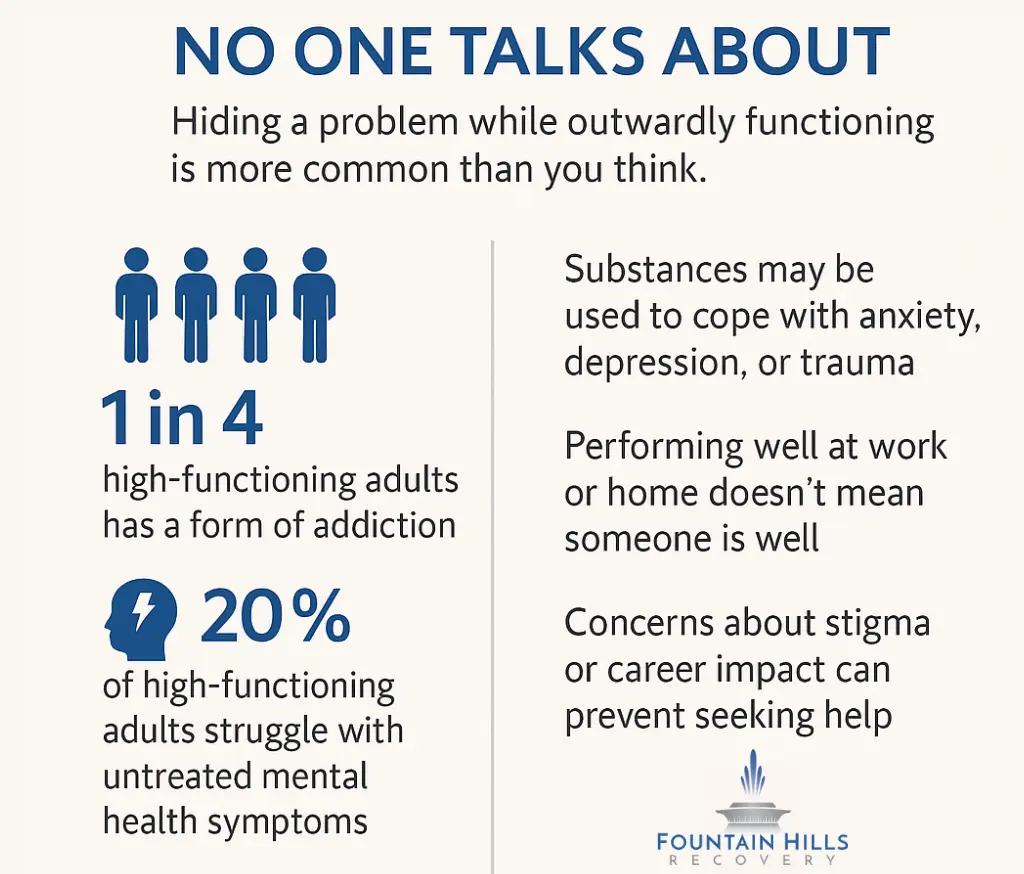You don’t look like someone who needs help. That’s the problem.
You’re managing. Meetings, kids, deadlines. You’re productive, on time, well-dressed, and never miss a beat. But what most people don’t see is what it takes to hold that together. The self-medicating. The panic under the surface. The emotional exhaustion that hits when the door closes.
At our dual diagnosis treatment center in Fountain Hills, AZ, I’ve worked with clients who embody this “double life.” They’re not lying—they’re surviving. But survival isn’t the same as healing. And when mental health struggles and substance use intersect behind the scenes, even high-functioning people can quietly begin to unravel.
The Hidden Strain of Performing Wellness
From the outside, you’re thriving. But on the inside, you’re managing an invisible war.
Maybe you’ve convinced yourself it’s “not that bad.” You don’t drink in the mornings. You don’t miss work. You haven’t “hit bottom.” But you do rely on pills to sleep, alcohol to relax, or stimulants to stay alert. You do feel like you can’t stop. And you do wonder what would happen if someone really knew.
This is what high-functioning addiction looks like. And when it overlaps with untreated anxiety, depression, trauma, or ADHD, it becomes more than a habit—it becomes a cycle. That’s where dual diagnosis treatment becomes essential.
What Is a Dual Diagnosis Treatment Center?
A dual diagnosis treatment center is built to treat both mental health disorders and substance use disorders at the same time—because separating them doesn’t work when they feed each other.
At Fountain Hills Recovery, our program is designed to:
- Address the root causes of substance use (not just the symptoms)
- Treat co-occurring conditions like anxiety, depression, PTSD, or bipolar disorder
- Help clients build sustainable coping skills that don’t require substances
- Provide therapy that respects high-functioning roles and adult life realities
Dual diagnosis care isn’t “extra.” It’s smarter. It’s what people need when their symptoms don’t fit neatly into one box.
High-Functioning Doesn’t Mean “Fine”
It’s easy to believe that as long as you’re functioning, you’re okay. But in my work, I’ve seen functioning become a mask—one that hides exhaustion, anxiety, shame, and loneliness.
You might recognize this in yourself:
- You drink just enough to sleep, but not enough to “seem” like a problem
- You use medication in a way that’s not prescribed, but helps you perform
- You cancel social plans because your mood is unpredictable
- You fear what might happen if you don’t self-medicate
High-functioning doesn’t mean your pain is less real. It just means you’ve gotten good at hiding it.
Mental Health Symptoms Don’t Always Look Like Crisis
People often expect mental illness to show up as chaos. But sometimes it’s quiet. It’s the executive who cries in their car before walking into a boardroom. The parent who holds it together all day and falls apart at night. The friend who seems “tired” but is actually numb.
When substance use becomes the glue holding it all together, we stop questioning it. But dual diagnosis treatment gently asks the right questions:
- What are you using substances for?
- What pain are you trying to manage?
- Who might you be without the mask?
Recovery doesn’t mean you failed. It means you’re ready to stop surviving and start feeling.

The Fear of Being Found Out
One of the biggest reasons high-functioning clients don’t seek help sooner is fear. Fear of being labeled. Fear of being seen as weak, unstable, or dramatic. Fear of what it might mean to step away from work, from family responsibilities, from appearances.
But here’s what I tell clients every day: You don’t have to crash your life to justify care.
Dual diagnosis treatment is not a punishment—it’s a path back to integrity. It allows you to live without compartmentalizing your pain. It allows you to feel without fearing collapse. And it offers healing without asking you to abandon the parts of your life you value most.
What Treatment Looks Like at Fountain Hills Recovery
We understand that high-functioning clients have lives, roles, and identities they care deeply about. That’s why we tailor our dual diagnosis treatment to honor your responsibilities while supporting your recovery.
At our Fountain Hills facility, you’ll find:
- A private, serene setting for confidential care
- Individual and group therapy with licensed clinicians
- Evidence-based treatment for both mental health and addiction
- Psychiatric support for medication management
- Programs that respect your intelligence and autonomy
Most importantly, you’ll be seen—fully. Not just as someone who “has it all together,” but as someone who’s ready to feel whole again.
You Don’t Have to Choose Between Coping and Crashing
There is a life between barely managing and hitting bottom. You don’t have to wait for a crisis to start caring for yourself. You don’t have to hide anymore.
You’re allowed to want peace. You’re allowed to want clarity. And you’re allowed to ask for help—especially if you never have.
Frequently Asked Questions (FAQ)
What makes dual diagnosis treatment different from standard rehab?
Standard rehab often focuses only on substance use. Dual diagnosis treatment addresses both substance use and underlying mental health conditions at the same time. At Fountain Hills Recovery, we integrate therapy, psychiatry, and personalized care to treat the whole person—not just the addiction.
Do I need to “hit bottom” to qualify for treatment?
No. In fact, the sooner you get help, the better. Dual diagnosis treatment is ideal for people who are functioning externally but struggling internally. You don’t have to wait until things fall apart to deserve care.
Will I have to take time off work or explain this to others?
Every situation is unique. Some clients choose to take a break from work, while others find outpatient options that fit around their schedules. Our team will work with you to create a plan that balances your privacy, responsibilities, and recovery needs.
Ready to Stop Living a Double Life?
You don’t have to keep managing in silence. You don’t have to pretend everything’s fine. At Fountain Hills Recovery, we specialize in supporting high-functioning clients ready to take an honest step toward healing.
📞 Call (800) 715-2004 or visit our dual diagnosis treatment center in Fountain Hills, AZ, Scottsdale to learn how we can support you—without judgment, pressure, or labels. We see the part of you that’s still fighting. Let us help carry the rest.





